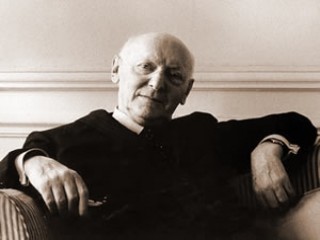
Isaac Bashevis Singer biography
Date of birth : 1904-07-14
Date of death : 1991-07-21
Birthplace : Radzymin, Poland
Nationality : Polish
Category : Famous Figures
Last modified : 2011-06-30
Credited as : Author, short-story writer, Satan in Goray
Isaac Bashevis Singer was born on July 14, 1904, in Radzymin, Poland. In his family's rabbinic tradition, he was groomed for Hasidism, attending a Warsaw seminary. However, he decided on a writing career. After completing his seminary studies, he worked as a journalist for the Yiddish press in various parts of Poland. Emigrating to the United States in 1935, Singer became a reporter for the Daily Forward in New York City, America's largest Yiddish newspaper. Although he personally adapted to his new habitat, his early literary efforts display nostalgia for the "old country"; the subjects seem part of a distant past remembered from vivid tales of Polish storytellers.
Singer's first novel, The Family Moskat (1950), was likened by critics to the narratives of Ivan Turgenev and Honore de Balzac. Based on Singer's own family, the novel succeeds in translating the almost metaphysical existence of an orthodox Jewish home into a universal reality. Two short stories, "Satan in Goray" and "The Dybbuk and the Golem" (1955), treat the provincialism, superstition, and naivete of eastern European peasants. A collection of short narratives, Gimpel, the Fool, and Other Stories (1957), reworked earlier themes but skillfully avoided repetition. Beneath the grotesque and folk elements, Singer includes in "Gimpel" a psychological-theological moral conflict in which an uncomplicated man finds his idyllic existence threatened by black magic and sorcery.
Modern man is the subject of Singer's novel The Magician of Lublin (1960), which portrays a protagonist who dares to violate the sanctity of tradition. The novel lacks the superb intricacy of The Family Moskat and the haunting suspense of "Gimpel." Still grappling with the modern experience, Singer sets the 11 short pieces of The Spinoza of Market Street (1961) in a post-World War II Polish ghetto. Having departed from his quaintly provincial world into contemporary urban madness, Singer revealed the stylistic limitations of his simple, flowing prose range. "I've always stayed in my same nook, my same corner," Singer reflected in retrospect. "If a writer ventures out of his corner he is nothing."
The Slave (1962), an epic of 17th-century Poland, recounts the brutal world of Russian Cossacks through the eyes of an enslaved, sensitive, pious Jew; yet somehow the work appeals to modern sensibilities. Once again Singer's flawless prose recaptures a timeless folk element. When a collection of vignettes filled with memories of Singer's childhood in the Warsaw ghetto, A Day of Pleasure: Stories of a Boy Growing Up in Warsaw (1969), won the National Book Award for children's literature, Singer remarked that he wrote for young people because "they still believe in God, the family, angels, devils, witches, goblins, and other such obsolete stuff." A Friend of Kafka, a collection of short fiction, appeared in 1970.
Recipient of numerous other literary awards, Singer remained an active journalist and critic for the Daily Forward throughout. He always wrote in Yiddish and then worked closely with his English translators because of the difficulty in finding equivalents for his subtle verbal nuances. His "simple" and "unchanging" fictions paradoxically have gained in popularity with a new generation possessing a taste for an obscure and sometimes grotesque past which seems more tangible than a nebulous future, for his stories capture the essence of the human condition.
Singer received numerous awards thoughout the latter portion of his life. Some of the more noted include Nobel Prize in literature (1978) and the Gold Medal for Fiction (1989). Singer continued to publish new material until his death in 1991.
















